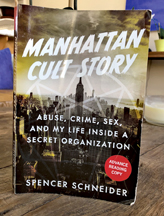Cult Following
Yoga, Greek life on campus, corporations, political groups, popular fitness classes, even religion; just some of the activities jokingly called “cult-like.”
As humans we look for structure, we like comfort, feel safer with answers than ambiguity, adore positive reinforcement, and want to be “seen,” or understood. Having someone to look up to that appears to be in control, and being accepted and welcomed into a group are fundamental aspects to our existence. How then can someone join an actual cult, one that is destructive, controlling and exploitive of its members?
 New York attorney, Hamptons resident, and marathon swimmer Spencer Schneider has written a sensational novel about his experience in an exclusive, Manhattan based cult of elite professionals. Described by Schneider as people “just like you,” Manhattan Cult Story details the experience of twenty-three years in a cult, from recruitment to his final break free.
New York attorney, Hamptons resident, and marathon swimmer Spencer Schneider has written a sensational novel about his experience in an exclusive, Manhattan based cult of elite professionals. Described by Schneider as people “just like you,” Manhattan Cult Story details the experience of twenty-three years in a cult, from recruitment to his final break free.
When we dig deeper in to the psychology of cults, we must realize how members are recruited systematically, are influenced though social channels and processes, no one simply joins. Leaders of such cults use manipulation tactics to control their members by targeting emotional vulnerabilities, situational tragedies and transitions in potential members’ lives such as loss of a loved one or relocating to a new area, and offering an illusion of security and acceptance.
As detailed in the novel, Schneider was recruited through a strategy of a safe channel; someone he knew socially from his hobby of playing music. A hallmark of cults includes using deception, typically though an authoritarian leader that members must follow without question. Over time members begin to form a new identity within the cult, as fellow members become the closest people in their lives while former friends and family members gradually become more distant.
True to cult form, Schneider’s experience included being “broken” emotionally, sometimes physically through hard labor, simultaneously praised and berated to provoke fear, guilt and martyrdom for the good of the leader and the group. Most striking about Manhattan Cult Story are the members; highly educated finance managers, accountants, physicians, attorneys, professionals we think should be too savvy to ever join a “cult.”
From a neurological perspective, “brainwashing” over time is when the brain’s emotional processing starts to take over while the critical thinking (“what am I doing here?”) becomes numbed, allowing the follower to be controlled. As social beings we need to belong as it is necessary to our survival, and cult-like tactics take advantage of our very human nature.
We were appreciative to have the opportunity to ask Spencer Schneider a few questions about exposing the cult, and why it is important that we pay attention to this story.
What is the most consistent question you are asked about the book? How is it that an educated, successful person could get sucked into a cult?
That question seems to be what draws readers in. Are you surprised by anyone’s reaction to reading it? I was surprised how deeply impacted readers have been, telling me about traumatic experiences having nothing to do with cults. I was also surprised that the grown child of a former leader who I never knew reached out to thank me for speaking out. And I’m thrilled that several current members have seen the book and gotten out.
Even though it was almost three decades ago and pre-internet as we know it, this cult and others still exist. Why do you think that is? Everyone needs community and friendships. When these are lacking or not fulfilling, or when we lack self-esteem, we can be vulnerable to predatory people like cult leaders and hucksters and abusive spouses/situations.
People hear ‘cult’ and probably say, ‘that would never happen to me.’ What do you say to that? I would tell them that I didn’t realize I was in a cult until 23 years plus the day after I got out.
What can we all learn from this? I hope people can see that cults and mind control and group think are serious and pervasive problems which are not isolated to crazy people living in some commune in northern California. Everyone can fall for mis-information, hoaxes, and cons. And everyone can be gaslighted. Indeed, almost half of this country believes that the 2020 election was stolen. But I also want to spread the word that there is hope because people can escape from abusive situations and not only recover from trauma but come out stronger for it.
What has been the most challenging part about writing this? To explain what I liked about being in the group. Most of my memories were bad, painful. I had to dig deep to remember what I liked about being in this group for 23 years; what was the attraction?
What was the most rewarding about it? I’m thrilled beyond words that the book was published. I never dreamed it would be. But now that it has been, I’m pleased that I can possibly help others.

No comments:
Post a Comment